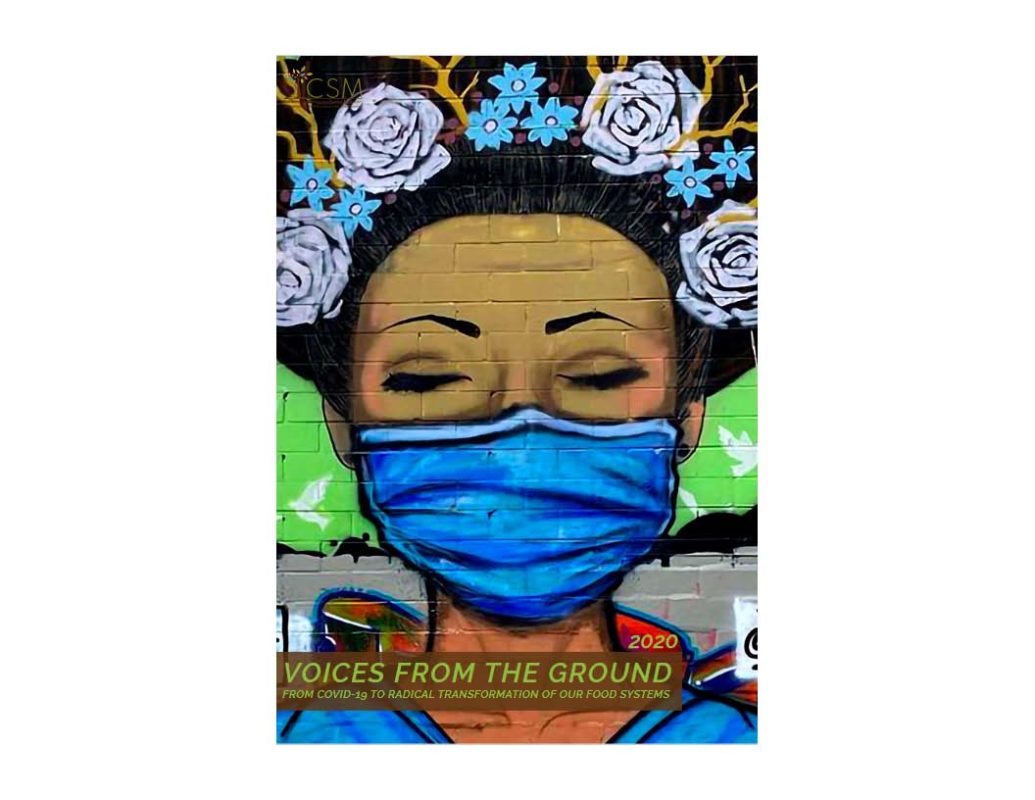CFS Civil Society and Indigenous Peoples’ Mechanism (CSM)
Contribution of 3 in depth reports by André Luzzi, CFS Civil Society and Indigenous Peoples’ Mechanism (CSM) representative, Habitat International Coalition, BrasilCSM 2020. Voices from the Ground from COVID-19 to Radical Transformation of our Food Systems. 11 October 2020. 70 pages.
- This report is a comprehensive analysis on grassroots experience of impacts of COVID-19, assessment of the policy measures and examples of innovative responses from communities.
- It provides an incisive analysis on the urgent responses that the CFS must to take to address COVID-19 crisis. All from the experience and expertise of the peoples’ most affected.
- Collective contributions were provided by: CSM constituencies and sub-regions.
- Inputs were made by a number of organizations and networks including: Aardeboerconsument, ARWC, Biowatch, CFFACAPE, COODDEFFAGOLF, COPROFAM, ECVC, El Poder del Consumidor, FIAN, ETC Group, FOEI, IFOAM, Focus on the Global South, HIC, ICFS, IITC, IUF, LVC, Oxfam, PROPAC, Redsan-CPLP, Rikkolto, ROPPA, Schola Campesina, Terra Nuova, Solawi, Urgenci, WFFP
Short policy report
- CSM 2020 Voices from the Ground from COVID-19 to Radical Transformation of our Food Systems. Short policy report - 22 pages
- CSM 2020 Voces desde los territorios: de la COVID-19 a la transformación radical de nuestros sistemas alimentarios
- CSM 2020 Voix des Communautés: de la COVID-19 à la transformation radicale de nos systèmes alimentaires
CSM Youth Working Group (2020) The CSM Youth Demands for a Radical Transformation of Our Food Systems 11 October 2020, 11pages
 |
| Add caption |
- This Declaration brings together an analysis of the impact of COVID-19 and the responses of governments on youth, with a youth vision for transforming food systems, and concrete steps for doing so.
- This Declaration, prepared by the CSM Youth Working Group, is the outcome of a participatory process of sharing experiences, struggles, visions and solutions.
- The youths engaged in this process represent perspectives from all CSM constituencies: smallholder producers, urban food insecure, consumers, young women, men and non-binary youths, food and agriculture workers including migrant and seasonal workers, pastoralist youths, Indigenous Peoples, fisherfolk, hunters and gatherers, and students.
- They are based in India, Mozambique, Australia, Canada, Norway, the Netherlands, Brazil, Puerto Rico, South Africa, Argentina, Kenya, and the United States.
CSM Women’s Working Group (2020) Gender, COVID-19 and Food Systems:impacts, community
responses and feminist policy demands. 11 October 2020, 34 pages- This publication is a report of the Women’s Working Group of the Civil Society and Indigenous Peoples’ Mechanism (CSM) and summarizes research around the impacts of the COVID-19 crisis on women in and across the constituencies and regions of the CSM.
- From a feminist perspective, the COVID-19 crisis is a global care crisis, where states and governments have failed to prioritize people’s interests, while (transnational) corporations are increasingly capturing and dismantling the public commons to impose their own private interest.
- Based on the research, the report summarizes acts of mutual aid and solidarity, as well as negative impacts experienced by women around the world.
Private sector activities, commitments, and issues related to COVID-19 and a position paper on key actions needed
Contribution by Diane Holdorf, Managing Director, Food and Nature, World Business Council for Sustainable Development (WBCSD), and CFS Private Sector Mechanism (PSM) representative, based in Geneva, Switzerland,
"These are difficult times to grow, process and retail food. Private sector is working very hard to keep food in people's hands."
WBCSD (2020) Protecting nutrition security amid COVID-19. 26 June 2020. 4 pages
- This Knowledge Summary identifies critical issues for business response: (i) Provide social protection and life-saving services ; (ii) Sustain the production, trade, retail and consumption of nutritious foods ; (iii) Support small and medium enterprises (SMEs) ; (iv) Take an integrated systems approach to building back better
- Companies, governments, development partners and civil society have unique, critical roles to mitigate negative short-term impacts and advance collective efforts to build back better.
- This summary sets out the key areas and imperative for business response with recommendations for responsible, effective and collective action.







No comments:
Post a Comment